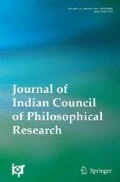Abstract
Professional ethics, in general, deals with justified moral values that govern the work of professionals. Profession is an expertise who is committed to promote a distinctive public good, such as learning or education. Professionals are committed to special duties to make services available, maintain confidentiality, secure informed consent for services, and be loyal to clients, employers, and others with whom one has fiduciary relationship. Professional ethics deals with theoretical issues which seek to understand how the justified moral values governing professionals are linked to wider values. It also deals with practical issues as to how to apply duties in particular contexts. Professional values include principles of obligation and rights, virtues, personal moral ideals as manifested in the great lives. Given such a Western idea of professional ethics, it is indeed fascinating to trace professional ethics in the Upaniṣads. The Upaniṣadic sages since time immemorial have shown the path to peace and progress for all humanity, not only by laying down theoretical ideals or speculation, but by actually applying truths in their practical life. They have demonstrated the practical application of the ethical ideals or moral values in the personal and professional life and proved that self-realization alone can not only save man from misery but promote to the state of highest bliss. The standards laid down by them have been followed practically by people even today. Gītoponiṣad states that whatever action is performed by the great is imitated by the common people; whatever standard is set by him is followed by them. The Kaṭha Upaniṣad prescribes professional values to the extent that not he who has not ceased from evil conduct (duścarita) can obtain Him by knowledge. Good conduct as a value is thus emphasized here. In Taittirīya Upaniṣad, for instance, the teacher prescribes certain values in the form of commandments: speak the truth and practice virtue (satyam vada, dharmam cara). Thus, it is evident that the Upaniṣadic teacher is not only concerned about the intellectual progress of the student but also its personal and professional life as well. The paper is a humble attempt to explore the roots of professional ethics in the Upaniṣadic ethics.
Similar content being viewed by others
Notes
Ibid.
Ibid., pp. 4125–4128.
Ibid.
Audi, Robert. Op. Cit, p. 749.
Meyes, Christopher. Op. Cit, p. 4129.
Ibid.
Ibid., pp. 17–18.
Ibid., p. 4131.
Koehn, Daryl. Op. Cit, p. 14.
Ibid., p. 4132.
Ibid., pp. 4132–4133.
Bṛhadāraṇyaka Upaniṣad, 4.4.23.
Taittirīya Upaniṣad. 1.11.1.
Kaṭha Upaniṣad. 1.2.24.
Brahma Sūtra Śaṁkara Bhāṣya, 2.1.9 & 14.
Māṇdukya Kārikā, 2.31 &35.
Bhagavad Gītā Śaṁkara Bhāṣya, 18.5.
Bṛhadāraṇyaka Upaniṣad, 2.1.20 & Bhagavad Gītā Śaṁkara Bhāṣya, 13.13.
Chāndogya Upaniṣad, 8.7.1–3.
Chāndogya Upaniṣad, 8.8.1–5.
Chāndogya Upaniṣad, 12.1 & 9.1–2.
Bhagavad Gītā Śaṁkara Bhāṣya, III.21.
Taittirīya Upaniṣad, 1.11.1.
Ibid. 1.11.4.
Sharma, I.C. (1965) Op.Cit., p. 87.
Ibid., p. 371.
Ibid., p. 372.
Iśā Upaniṣad.1.
Bṛhadāraṇyaka Upaniṣad, 2.4.24.
Kaṭha Upaniṣad, 1.2.2.
Ranganathan, Shyam.(Ed.)(2017),Op.Cit., p.373.
Guha, Debashis. Op.Cit., p. 39.
Ibid.
Sharma, I.C. (1965) Op.Cit., p. 55.
Ranganathan, Shyam. (2017). Op. Cit., p. 383.
References
Airaksinen, T. (2012). Professional ethics. In R. Chadwick (Ed.), Encyclopedia of applied ethics (2nd ed., Vol. 3, p. 616). Springer.
Airaksinen, T. (2012). The philosophy of professional ethics. In Ethics in institutional issues involving ethics and justice (Vol. I. p. 2). http://www.eolss.net/sample-chapters/c14/e1-37-02-02.pdf.
Audi, R. (1999). The Cambridge dictionary of philosophy (2nd ed., pp. 34–35). Cambridge University Press.
Bajaj, P. S., & Agrawal, R. (2009). Business ethics: An Indian perspective (p. 11). Biztantra Publishers.
Basham, A. L. (2004). The wonder that was India (3rd ed., p. 255). Wiley.
Boatright, J. R., & Smith, J. D. (2017). Ethics and the conduct of business (p. 16). Pearson.
Chinmayananda, S. (2002). Śaṁkara the missionary (pp. 84–85). Central Chinmaya Mission Trust.
Deussen, P. (2011). The philosophy of the upaniṣads (p. 365). Motilal Banrsidass.
Guha, D. (2007). Practical and Professional ethics (Vol. 1, p. 63). Concept Publishing Company.
Kelly, T. M. (2018). Professional ethics: A trust-based approach (p. xi). The Rowman and Littlefield Publishing Group Inc.
Koehn, D. (1994). The ground of professional ethics (p. 1). Routledge.
Mahadevan, T. M. P. (2010). Upaniṣads (pp. 129–130). Motilal Banarsidass.
Meyers, C. (2013). Professional ethics. In H. Lafollett (Ed.), International encyclopedia of ethics (Vol. VII, p. 4121). Wiley.
Naagarazan, R. S. (2006). A textbook on professional ethics and human values (p. 17). New Age International Publishers.
Ranganathan, S. (Ed.). (2017). The bloomsbury research handbook of indian ethics (p. 370). Bloomsbury Academic An Imprint of Bloomsbury Publishing Plc.
Sharma, I. C. (1965). Ethical philosophies of India (p. 55). Harper and Row.
Tiwari, K. N. (1998). Classical Indian ethical thought (pp. 79–81). Motital Banarsidass.
Funding
No funding received for this journal.
Author information
Authors and Affiliations
Corresponding author
Ethics declarations
Conflict of interest
The authors declare that they have no conflict of interest.
Additional information
Publisher's Note
Springer Nature remains neutral with regard to jurisdictional claims in published maps and institutional affiliations.
Rights and permissions
About this article
Cite this article
Maharana, S.K. Professional Ethics: An Upaniṣadic Perspective. J. Indian Counc. Philos. Res. 39, 97–109 (2022). https://doi.org/10.1007/s40961-022-00280-y
Received:
Revised:
Accepted:
Published:
Issue Date:
DOI: https://doi.org/10.1007/s40961-022-00280-y




